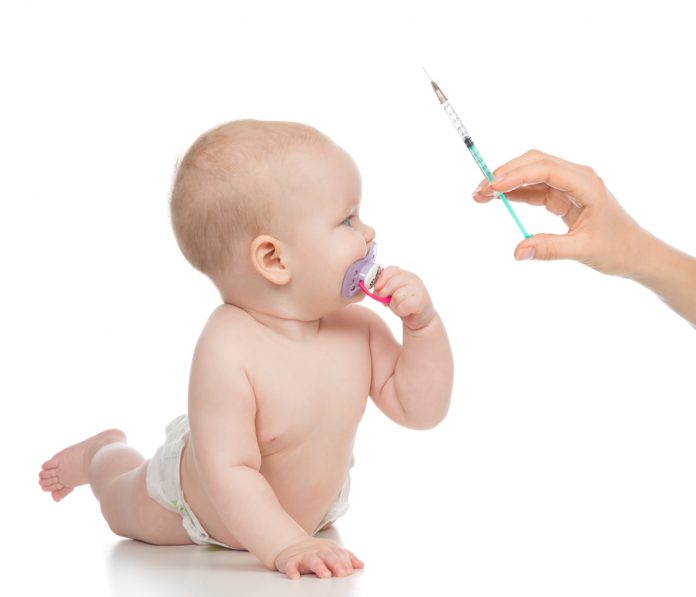This post is also available in: English हिन्दी (Hindi) বাংলা (Bengali)
An integral part of an infant and toddler’s growing up years is immunization from certain serious or deadly infections. Vaccines work by preparing the body to fight the germs that cause these infections.
Vaccines are usually available as shots, but some come as oral medicines that children swallow.
Why should my child get vaccinated?

Getting vaccinated can help keep your child from getting sick. If your child does get sick, being vaccinated can keep him or her from getting severely ill. Plus, being vaccinated also helps protect the people around your child from getting sick.
How many vaccine doses does my child need?

Each vaccine is different. Some vaccines work after just 1 dose. But most need 2 or more doses to prevent an infection. Vaccines usually take a few weeks to start working.
At what ages will my child need vaccines?
Most babies get their first vaccine at birth when they get their first dose of the hepatitis B vaccine. After that, most healthy children follow a set vaccine schedule. Even though doctors follow a set vaccine schedule, children can be given certain vaccine doses at different times.
Some children will follow a different vaccine schedule. Children might be on a different schedule if they have certain medical problems or started getting their vaccines later than usual, or started getting their vaccines on time, but then missed doses and fell behind schedule
Are all the vaccines provided free of cost by the government of India?
There are certain mandatory vaccines like BCG, DPT, HiB, MMR, Hep B, and polio vaccine which are available free of cost for all babies. The other vaccines like Typhoid, Chicken Pox, Hepatitis A, Rotavirus, Pneumococcus and Influenza vaccines are optional and are paid for.
What side effects can vaccines cause?

Often, vaccines cause no side effects. When they do cause side effects, they can cause:
- Redness, mild swelling, or soreness where the shot was given
- A mild fever
- A mild rash
- Headache or body aches
Vaccines also sometimes cause more serious side effects such as severe allergic reactions. But these are rare.
Ask your child’s doctor what to expect each time your child gets a vaccine. If your child has a reaction or a problem after a vaccine, let the doctor know about it immediately.
What if my child is sick on the day of his / her vaccination shot?
If your child is sick and supposed to get a vaccine, let your pediatrician know. Depending on the type of vaccine and your child’s symptoms, the doctor might give your child the vaccine or wait until your child is better.
Should I keep track of my child’s vaccines?
Yes. It is important to keep a list of the vaccines that your child gets and when he or she gets them. Many schools and day care centres need this information before they let a child in. You can keep the list up-to-date by bringing it to your child’s check-ups.
Refer to the immunization schedule for your baby:
| Age | Immunization |
| At Birth | BCG, OPV0, Hep B1 |
| 6 weeks | DTP1, IPV1, HepB2, Hib1, Rotavirus1, PCV1 |
| 10 weeks | DTP2, IPV2, Hib2, Rotavitus2, PCV2 |
| 14 weeks | DTP3, IPV3, Hib3, PCV3 |
| 6 months | OPV1, HepB3 |
| 9 months | OPV2, MMR1 |
| 9-12 months | Typhoid Conjugate Vaccine |
| 12 months | Hep-A1 |
| 15 months | MMR2, Varicella 1, PCV booster |
| 16-18 months | DTP booster1, IPV booster1, Hib Booster 1 |
| 18 months | Hep-A2 |
| 2 years | Typhoid booster |
| 4-6 years | DTP booster 2, OPV3, Varicella 2, Typhoid booster |
| 10-12 years | Tdap/Td, HPV |
Is there a benefit to delaying vaccines until my child gets a little older?
No! Delaying vaccines can be quite dangerous. The vaccine schedules doctors recommend have been carefully studied. Do not delay your child’s vaccines at any cost.
Hope this article was useful. For any doubts, do comment below. Bye for now!
By
Dr. Shreya Sharma

Dr. Shreya Sharma is a childcare expert and an M. D. in Pediatrics, she is currently a Pediatrician with fellowship in Pediatric Endocrinology, Mumbai.
This post is also available in: English हिन्दी (Hindi) বাংলা (Bengali)










